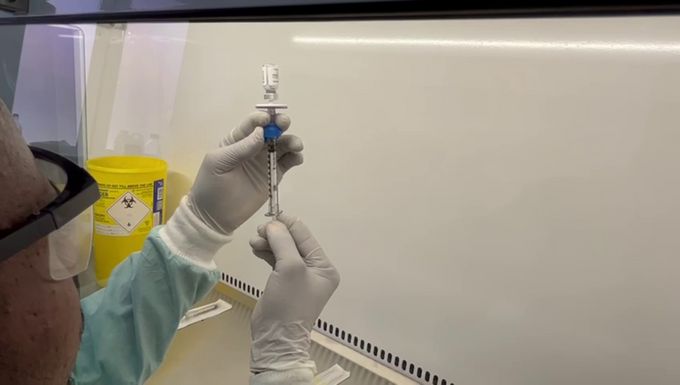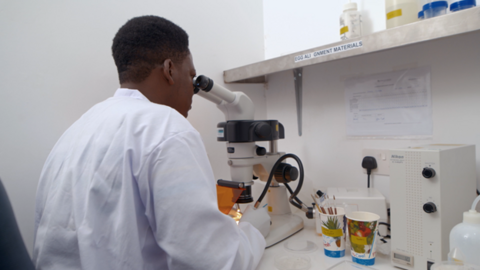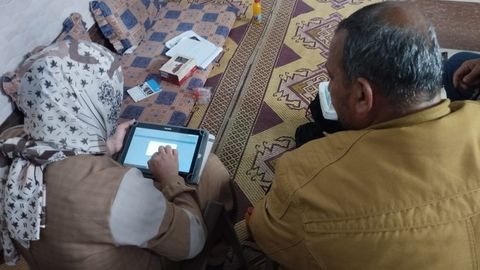SUM-101, a new malaria vaccine candidate has shown to be safe and to trigger strong immune responses in adults living in a malaria-endemic region of Tanzania. The study, conducted by researchers from the Ifakara Health Institute (IHI), the Swiss Tropical and Public Health Institute (Swiss TPH) and Sumaya Biotech GmbH & Co. KG (Sumaya Biotech), represents an important step towards developing next-generation vaccines to complement existing malaria prevention tools.

In its first trial among malaria-pre-exposed adults in Tanzania, the SUM-101 malaria vaccine was found to induce strong immune responses and be well tolerated. (Photo: M.Saxena/Swiss TPH)
In 2023, approximately 263 million clinical cases of malaria were reported, resulting in nearly 600,000 deaths, primarily among young children in sub-Saharan Africa. Almost all severe malaria cases or deaths were due to infections with Plasmodium falciparum. Two malaria vaccines are currently approved and recommended for deployment in the field, named RTS,S and R21, marking a major progress in the fight against the severe disease burden caused by P. falciparum. However, these vaccines elicit only partial protection, falling short of the >90% efficacy needed to achieve the aim of malaria elimination. There is therefore an urgent need for the development of next generation malaria vaccines that either alone or in combination of the current vaccines provide higher and longer-lasting protection against P. falciparum.
One potential new malaria vaccine, called SUM-101, was developed by Sumaya Biotech in Heidelberg, Germany. SUM-101 is based on the full-length merozoite surface protein 1 (MSP1) formulated with the GLA-SE adjuvant. MSP1 is a major antigen on the parasite stage that invades red blood cells and a key target of protective immune responses, while the GLA-SE adjuvant boosts the body’s immune response. SUM-101 was tested for the first time in human in malaria-naïve German study participants, with favourable safety and immunogenicity outcomes. As a next step in the clinical development path of this vaccine, SUM-101 needed to be tested for safety and immunogenicity in malaria pre-exposed populations.
The Phase Ib clinical trial, conducted in Bagamoyo, Tanzania, at the clinical trial facility of the Ifakara Health Institute (IHI) was the first to evaluate SUM-101 in malaria pre-exposed adults. The study was conducted in a collaboration of researchers from Swiss TPH's Clinical Operations unit, IHI and Sumaya Biotech. Forty healthy volunteers aged 18–45 years were randomly assigned to receive three doses of either SUM-101 or a control rabies vaccine in a period between August 2023 and April 2024. Participants were closely monitored for safety and vaccine induced immune responses for a follow up period of 140 days.
The vaccine was well tolerated, with no vaccine-related serious adverse events reported. SUM-101 triggered strong and lasting antibody responses, with antibody levels peaking one month after the final dose and remaining elevated throughout the follow-up period. These antibodies recognised genetically different strains of P. falciparum and activated a range of key immune defence mechanisms that may contribute to vaccine induced protection.
The study also provides new insights into how prior malaria exposure has the potential to shape vaccine-induced immunity. Adults who had already developed natural immunity showed a faster and strong increase in IgG antibody levels, indicating that the vaccine boosts existing immune memory rather than triggering entirely new responses. This phenomenon – if confirmed in follow up studies – could be a crucial determinant in developing optimal vaccines adapted for populations already pre-exposed to malaria.
“These findings are highly encouraging as they demonstrate that SUM-101 can safely boost pre-existing malaria immunity and stimulate a variety of antibody functions that could contribute to protection,” said Claudia Daubenberger, study co-lead and Head of the Clinical Immunology unit at Swiss TPH. “A highly effective blood-stage vaccine would fill an important gap by complementing existing pre-erythrocytic vaccines. SUM-101 has the potential to become a component of a next generation malaria vaccine.
Ally Olotu, Director of Science at IHI and study co-lead, added: “This carefully conducted study in Bagamoyo underscores the impressive local research capacity and the importance of evaluating malaria vaccines within the populations most affected by the disease. Our findings demonstrate that SUM-101 was well tolerated among adults previously exposed to malaria, which is an important step before moving on to trials in children, who remain the most vulnerable group in terms of severe disease and death. Malaria vaccines are an essential intervention and will play a pivotal role in accelerating the path towards malaria elimination, an outcome that represents the shared ambition of the global scientific community.”
“SUM-101 builds on decades of malaria research at Heidelberg University, particularly the pioneering work of Hermann Bujard, whose vision of using the full-length merozoite surface protein 1 as a vaccine antigen laid the scientific foundation for this candidate,” said Michael Lanzer, scientific advisor at Sumaya Biotech and Professor of Parasitology at Heidelberg University. The immunological responses elicited by SUM-101 were analysed at the Malaria Clinical Trials Unit, Heidelberg University, led by Richard Thomson Luque, who is also scientific director at Sumaya Biotech. “These close collaborations between European and African research institutions show how scientific partnerships can accelerate vaccine innovation and bring laboratory discoveries closer to the people who need them most,” he stated.
“The results justified continuing the clinical development of the SUM-101 vaccine. Sumaya Biotech is very grateful for the support from Swiss TPH and IHI which bring a wealth of expertise in clinical evaluation of Malaria vaccines,” added Dominique Doyen, CEO of Sumaya Biotech.
In 2025, two follow-up studies sponsored by the European Vaccine Initiative (EVI) have been initiated to further advance the development of SUM-101:
- A Phase Ib trial in Burkina Faso (NCT06618885) involving infants (5–17 months) and young children (18 months–5 years), designed to assess the vaccine’s safety and immune responses in the population most affected by malaria.
- A Phase Ib study in Tanzania (NCT07124156) enrolling adults and including a Controlled Human Malaria Infection (CHMI), to evaluate the vaccine’s protective potential under highly controlled experimental conditions.
The results are anticipated to yield important insights for accelerating the development of next-generation malaria vaccines, designed to provide broader, longer-lasting protection, particularly for the populations most affected by the disease.
Publication
Kahatano A-E, Mpina M, Vanobberghen F, et al. Full-length merozoite surface protein 1 formulated with GLA-SE adjuvant in malaria pre-exposed adults: a randomised, controlled, double-blind, parallel-group, single-centre Phase Ib trial. eClinicalMedicine
About the study
The study was conducted by the Ifakara Health Institute (IHI) in Tanzania and the Swiss Tropical and Public Health Institute (Swiss TPH) in Switzerland, in collaboration with Sumaya Biotech GmbH & Co. KG in Germany. The vaccine candidate SUM-101 was developed and manufactured by Sumaya Biotech under Good Manufacturing Practice (GMP) conditions. The clinical trial was implemented at IHI’s Bagamoyo site with scientific sponsorship from Swiss TPH. Sumaya Biotech provided funding thanks to the loan it received from the EU Malaria Fund.
Contact

Claudia Daubenberger
DVM, Prof. Dr.
Head of Unit
+41612848217
claudia.daubenberger@swisstph.ch


